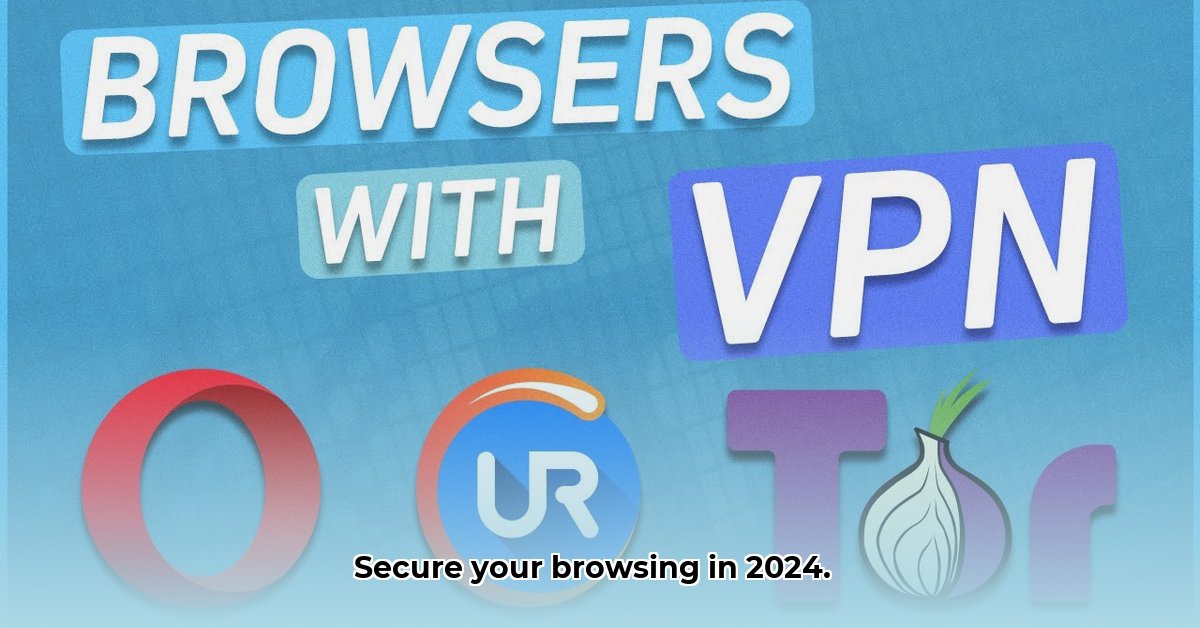
Want to browse the web privately and securely? A browser VPN can help, but choosing the right one requires careful consideration. This guide compares popular options, explaining key features and helping you make an informed decision, even if you're not a tech expert.
Understanding Browser VPNs: Your Digital Shield
A browser VPN creates a secure, encrypted connection between your browser and the internet. This hides your browsing activity from your internet service provider (ISP), potential hackers, and other third parties. Think of it as a secret tunnel for your data, protecting your online privacy. However, crucial distinctions exist between a browser VPN and a full-system VPN; while a browser VPN secures your browser traffic, a full-system VPN protects all online activity.
Don't assume all browser VPNs are equal. Some offer robust security features, while others may compromise on privacy for the sake of convenience. This guide helps you navigate these complexities.
Key Features to Consider:
Encryption (AES-256): This is the bedrock of VPN security. AES-256 (Advanced Encryption Standard with 256-bit keys) is considered the gold standard, making your data virtually unreadable to intruders. (AES-256 is a sophisticated encryption method that scrambles your data, making it unintelligible without the decryption key).
Protocols (WireGuard, OpenVPN): These are the sets of rules governing your secure connection. WireGuard is known for its speed and security, while OpenVPN is a more established and widely-supported option. A good browser VPN will offer at least one of these. (Protocols are the underlying rules guiding how data is sent and received securely).
Kill Switch: This critical feature cuts your internet access if your VPN connection unexpectedly drops, preventing data leaks. It's an essential safety net for maintaining privacy. (The kill switch acts like an emergency shutoff, protecting your data if the VPN connection fails).
Logging Policy: Transparency is key. A reputable browser VPN provider will have a clear, easily accessible "no-logs" policy detailing what data they collect and for how long. Ambiguous policies should raise red flags. (The logging policy explains how the VPN provider handles your data—a strict no-logs policy is ideal).
Server Network: A larger network of servers usually translates to faster speeds and better access to geo-restricted content.
Cost (Free vs. Paid): Free browser VPNs often monetize your data, ultimately compromising your privacy. Paid services typically offer superior security, features, and customer support.
Top Browser VPN Comparisons: A Detailed Analysis
The following table compares several popular browsers with integrated VPN options. Note: VPN technology evolves rapidly, so always check the provider's website for the most up-to-date information.
| Browser & VPN | Encryption | Protocols | Kill Switch | Logging Policy | Cost | Pros | Cons |
|---|---|---|---|---|---|---|---|
| Opera's Built-in VPN | AES-256 | Multiple | Yes | Limited logging is mentioned | Free/Paid | User-friendly, good performance; integrated into a popular browser | Fewer server locations in free version; limited features in the free plan |
| Brave's Built-in VPN | AES-256 | Multiple | Yes | Transparency is emphasized | Free/Paid | Fast, privacy-focused browser; integrated into a popular browser | Relatively new, features may still be under development |
| Avast Secure Browser's VPN | AES-256 | Multiple | Yes | Past concerns about logging | Paid | Strong security features | Past concerns regarding logging practices; needs to rebuild trust |
| Firefox (with VPN Extensions) | Varies | Varies | Varies | Varies; check each extension | Free/Paid | Highly customizable, many extension options available | Performance and security depend heavily on the chosen extension |
Important: Always independently verify a VPN provider's claimed logging policies on their website. Privacy policies can and do change.
Enhancing Your Online Security: Practical Steps
Beyond choosing a good browser VPN, these steps can further protect your online privacy:
Software Updates: Regularly update your browser, operating system, and VPN software to benefit from the latest security patches.
Scrutinize Privacy Policies: Always carefully read the privacy policy of any service before using it. This is crucial for understanding how your data is handled.
Choose Paid VPNs: While tempting, free VPNs often compromise your privacy for revenue. Investing in a reputable paid VPN offers significantly better security and support.
Explore Advanced Options (Optional): For heightened anonymity, you can explore combining a VPN with Tor. However, this is more complex and not advisable for less tech-savvy users.
"Choosing the right browser VPN is a crucial step in safeguarding your digital footprint," states Dr. Anya Sharma, Cybersecurity Expert at the National Institute of Cyber Security. "However, remember that no single solution provides absolute protection; a layered security approach is always the best strategy."
Remember, maintaining online security is an ongoing process. By staying informed, making informed choices, and adopting proactive measures, you can significantly reduce your online risks and enhance your privacy.